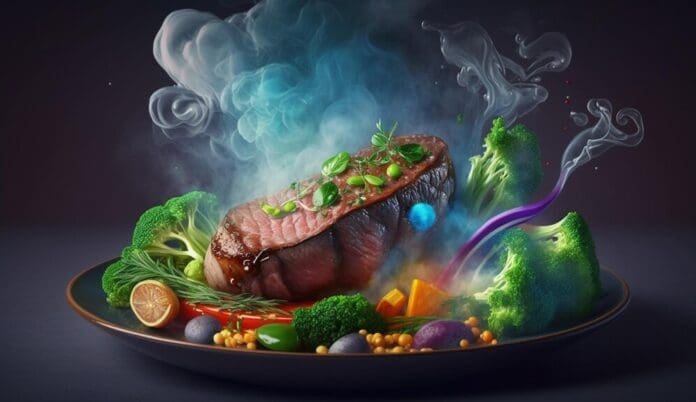Since the rise of chatbots, a lot of us have tried AI-generated recipes for once at least. So, you can tell that much of each dish didn’t appear to have been developed by AI. Therefore, it went far better than expected. AI chatbots can simplify the process of replicating creators’ recipes. But that doesn’t imply the cuisine is tasty.
The recipes received by them seemed strangely similar to those you can find on Instagram or food websites. Only Bard (now known as Gemini) provides credit by referencing a recipe from the author. To be fair, we’ve seen a lot of duplicated non-AI recipes circulating online, so this isn’t a new issue. But, with AI, the morality of duplicating recipes becomes more complicated. Its massive size raises the prospect of a future where human recipe makers are displaced by semi-randomized AI-generated competition; however, whilst this future has been suggested, it has not yet come to pass.

Similar recipes are a sensitive topic in the food industry, even when AI isn’t involved. A controversy may envelop certain influencers when a different food blogger or a cookbook author asserts that their recipes were stolen. In 2021, for example, author Sharon Wee sued British chef Elizabeth Haigh for stealing portions and recipes from her books; the New York Times reported on many cases of purported recipe theft. Then there’s the internet animosity directed towards Half Baked Harvest, a well-known food blogger accused of plagiarism multiple times.
However, if they believe someone stole their work, creators of food items have few legal options. A straightforward set of directions and ingredients is not considered an idea worthy of copyright protection. There is a strong component of oral tradition in many recipes, as many are handed down from generation to generation. Although some extensive personal preambles are protected by intellectual property rights, the most significant opposition to “stealing” recipes is frequently found in the daily snark posts on Foodsnark Reddit; the realm of recipes is mainly regulated by etiquette rather than legislation.
A certain number of components can be combined to make a decent recipe, much like there is a finite number of chords in music. Grab a pie crust. One can only compose a finite number of permutations involving flour, sugar, and butter before someone asserts that they have simply repeated the recipe.
The permutations can be swiftly analyzed by large language models, such as the ones used by ChatGPT and Gemini, and a rather good recipe can be produced. Therefore, it is commonly said that chatbots could be useful for locating recipes that fit to specific diets. However, to state the obvious, AI technologies aren’t capable of handling or consuming food in any way. They can only tell if a recipe follows a certain pattern, not whether it will actually work.
/cdn.vox-cdn.com/uploads/chorus_asset/file/24696245/23.05_AI_Recipes.png)
Blog owner and cookbook author Abi Balingit (The Dusky Kitchen) has stated that AI isn’t something she considers when making recipes. However, her main concern is that it could affect the platforms on which food bloggers and developers can showcase their work.
According to Balingit, AI is not hindering recipe creation because it cannot be guaranteed that its output will be effective. Instead, there are varying degrees of what is considered fine and not so good. “But the nature of media is transient and unstable, so I’m worried that there might be a point where publications might turn to an AI rather than recipe developers or cooks.”
Many businesses learned the hard way that generative AI can still have hallucinations and create things that don’t exist. Instacart, a grocery delivery service, teamed up with OpenAI, the company behind ChatGPT, to provide users with picture recipes. The outcomes varied, spanning from salmon Caesar salads that managed to create a hybrid of lettuce and lemon to hot dogs stuffed with an inner layer of tomato. The Washington Post noted that the steak size in Instacart’s recipe easily serves more people than expected, indicating that the proportions were incorrect. Furthermore, BuzzFeed introduced an AI-powered recipe recommendation engine under its Tasty brand.

People put a lot of faith in recipes and cooking demonstrations, as Balingit pointed out. You have the knowledge that comes from having cooked the dish and enjoyed it yourself.
That clarified why one felt compelled to verify chatbot recipes immediately. Even now, AI models can hallucinate and drastically underestimate the effect of ingredient volume on flavour. For instance, you might not enjoy the cake because the AI chatbot, for some reason, quadrupled the eggs, making it delicious but dense and gooey.
According to Balingit, one benefit of being a recipe creator is the personal connection. Mayumu, her cookbook, is a food trip that begins with her parents’ immigrant experience to the United States from the Philippines and continues with her formative years in California and her present home in New York. According to her, AI lacks the cultural and nostalgic ties that humans have with food and eating, which are shared experiences that have deep personal roots.
A Filipino meal, tinola, is one in which chicken is poached in a ginger broth. If you search the web for “authentic” recipes. You would look for a recipe by people who have personal and sentimental connections with the dish, not a chatbot. It is possible to create usable recipes using ChatGPT and Bard. But you might have to compromise with taste or even with your gut health.




